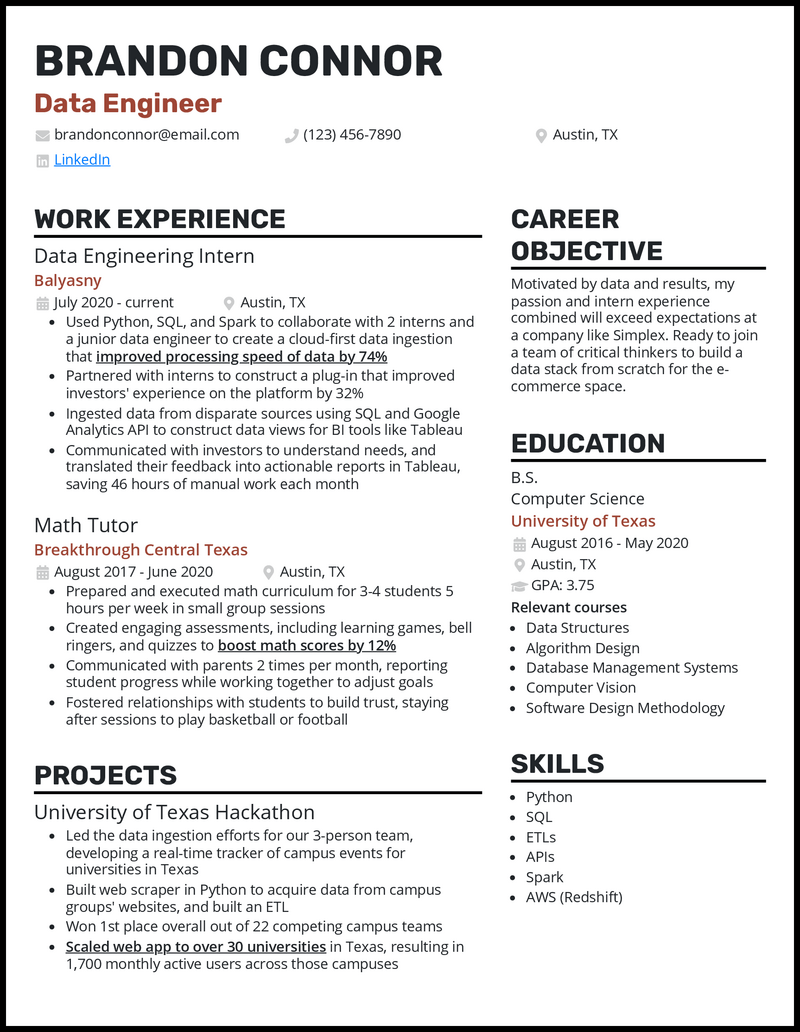At an entry level, you assist more experienced data engineers while they design, optimize, and maintain data pipelines. Since all data and resulting products are always changing, your primary role is bound to center around a lot of tweaking and bug-fixing!
But while you might be great at correcting errors, you may still have questions about your resume. How do you make the most of your credentials, and how should your resume look once it’s all polished?
Luckily, we’ve helped people in data engineering with their resumes for years! Check out these three entry-level data engineer resume examples and our time-tested cover letter (free) generator to get started!
Copy this text for your entry-level data engineer resume!
Brandon Connor
Data Engineer
[email protected]
(123) 456-7890
Austin, TX
CAREER OBJECTIVE
Motivated by data and results, my passion and intern experience combined will exceed expectations at a company like Simplex. Ready to join a team of critical thinkers to build a data stack from scratch for the ecommerce space.
WORK EXPERIENCE
Data Engineering Intern
Balyasny
July 2020 – current
Austin, TX
– Used Python, SQL, and Spark to collaborate with 2 interns and
a junior data engineer to create a cloud-first data ingestion that improved processing speed of data by 74%
– Partnered with interns to construct a plug-in that improved
investors’ experience on the platform by 32%
– Ingested data from disparate sources using SQL and Google
Analytics API to construct data views for BI tools like Tableau
– Communicated with investors to understand needs, and translated their feedback into actionable reports in Tableau, saving 46 hours of manual work each month
Math Tutor
Breakthrough Central Texas
August 2017 – June 2020
Austin, TX
– Prepared and executed math curriculum for 3-4 students 5 hours per week in small group sessions
– Created engaging assessments, including learning games, bell
ringers, and quizzes to boost math scores by 12%
– Communicated with parents 2 times per month, reporting student progress while working together to adjust goals
– Fostered relationships with students to build trust, staying after sessions to play basketball or football
PROJECTS
University of Texas Hackathon
– Led the data ingestion efforts for our 3-person team, developing a real-time tracker of campus events for universities in Texas
– Built web scraper in Python to acquire data from campus groups’ websites, and built an ETL
– Won 1st place overall out of 22 competing campus teams
– Scaled web app to over 30 universities in Texas, resulting in 1,700 monthly active users across those campuses
SKILLS
– Python
– SQL
– ETLs
– APIs
– Spark
– AWS (Redshift)
EDUCATION
B.S.
Computer Science
University of Texas
August 2016 – May 2020
Austin, TX
GPA: 3.75
Relevant courses
– Data Structures
– Algorithm Design
– Database Management Systems
– Computer Vision
– Software Design Methodology
Related resume examples
What Matters Most: Your Skills & Experience Sections

Even at an entry level, data engineering takes quite the lineup of skills! You may not act as a project lead or guide other data engineers in how to use various technical tools yet, but you still need to show that you know your stuff for when the time comes.
Recruiters are looking for potential and a great foundation for a shining career. Show them that you have what it takes by being selective and deliberately including skills that apply directly to your profession.
Don’t use vague or generic terms in your skills list. For instance, add programs by name instead of saying “database management software.” Here are some examples of what we mean:
9 best entry-level data engineer skills
- Python
- SQL
- ETLs
- MongoDB
- Restful APIs
- AWS Redshift
- Google Sheets
- MySQL
- Azure
Sample entry-level data engineer work experience bullet points
Your experience section is where you get to talk about the differences you’ve made with your skill set! Recruiters want to know that you have applied knowledge of your abilities and not just book knowledge (even though book knowledge never hurts!).
Make sure you reference experiences relevant to your profession. These don’t all have to be job experiences, either: You can include internships and college projects, too, if they call upon similar relevant skills.
And always, always measure your impact! Use quantifiable data to back up the success you’ve created with your abilities. Metrics make all the difference in the world for your credibility.
Here are a couple of samples:
- Created engaging assessments, including learning games, bell ringers, and quizzes to boost math scores by 12%
- Communicated with investors to understand needs and translated their feedback into actionable reports in Tableau, saving 46 manual hours of work each month
- Fostered relationships with students to build trust, staying after sports sessions and boosting engagement by 24%
- Centralized data from disparate sources using SQL and Google Analytics API to construct data views for BI tools like Tableau, boosting team efficiency by 11%
Top 5 Tips for Your Entry-Level Data Engineer Resume
- Show adaptability
- When you’re relatively new to a professional field, it’s good to show that you’re ready to adapt and learn. You can show your eagerness for new experiences by filling your history with a diverse array of accomplishments.
- Include those courses
- Alongside your degree(s) in your education section, include any other relevant courses you’ve taken. Bonus points if those courses came with certifications and are extra clear in how they relate to data engineering!
- Stay streamlined
- Keep your experience points concise and easy to interpret even though they’re packed with information. It’s tempting to try to bulk things up if your experience is a bit sparse—but sometimes less is more when your best qualifications get more room to shine!
- Use the job description as a style guide
- That might sound a bit weird at first, but think about it: What better way to reflect the company culture and tone than to re-read the data engineer job description with writing tone in mind? Mirror their style and skill emphasis to show how well you align with company values.
- Consider an objective
- An objective statement can be the introductory piece that ties your whole resume together: It should describe what your career goals are, how those goals benefit the company you’re applying to, and what makes you qualified. Just make sure any info you add here is specific to the company!
You can, yes, but make sure they’re minimal and strategically placed. Color should set off key bits of information, not distract from them—so pick tasteful colors and only use them for “centerpiece” elements!
If you’re relatively fresh out of college and have an impressively high GPA, it may be worth including! Just ensure that you include your GPA from courses that are relevant to your job role.
Tip: Fresh out of college means you’re probably short on work experience. You can beef things up by including relevant college courses, such as “Database Management Systems,” “Machine Learning,” or “Cloud Computing.”
You can choose from lots of templates and see which ones feels right for you! Consider things like which of your resume sections get the most visual emphasis, and which key experiences you might prefer to place in the spotlight.








